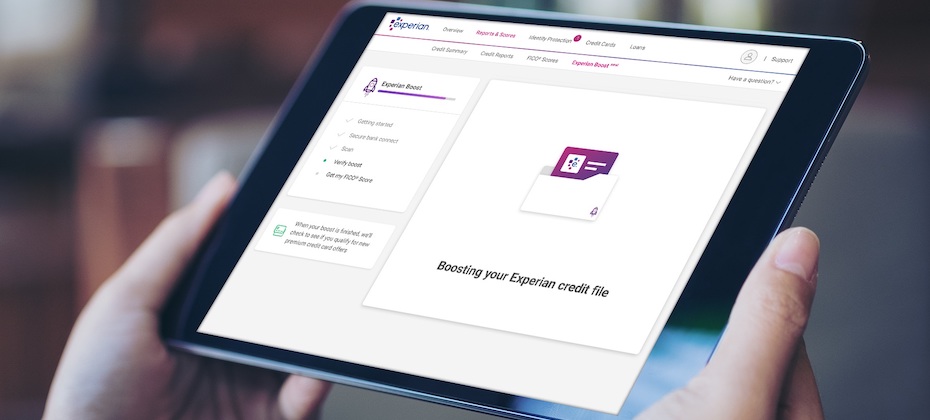Innovation
Insights from our Leaders

New Interactive, Web-Based Tool Offers to Help Financial Professionals New Interactive, Web-Based Tool Offers to Help Financial Professionals New Interactive, Web-Based Tool Offers to Help Financial Professionals Related Posts Lorem Ipsum available, but the majority have suffered alteration in some form, by injected humour, or randomised words which don't There are many variations of passages of Lorem Ipsum available, but the majority have suffered alteration in some form, by injected humour, or randomised words which don't look even slightly believable. If you are going to use a passage of Lorem Ipsum, you need to be sure there isn't anything embarrassing hidden in the middle of text. All the Lore Testing the Lates Post, recent post and related postPullquote to test Lates Post

After launching Experian Boost, the first-of-its-kind tool that allows consumers to instantly increase their credit scores, in March 2019 we recently reached a significant milestone. Millions of consumers have boosted their credit scores to the tune of 50 million total points. This means many consumers have improved score bands, saved money with better interest rates, and maybe reached some of their financial goals such as gaining access to credit for a home. In fact, we know our Boost users have gained access to more than 1.7 billion total dollars in credit as a result of improving their credit score. The idea behind Experian Boost is to give consumers control over their credit – to enable them to make real, substantial progress in their financial health journey by getting “credit” for paying bills on time. Our ability to help consumers in a challenging economic climate is what drives us to continue to innovate. For example, we recently expanded Experian Boost to add positive payment history for video streaming services such as Netflix in addition to telecom and utility payments. The benefits to having control and using tools like Experian Boost do not end there. Consumers receive a boosted FICO® Score, which is used by a majority of lenders giving them a great opportunity for credit with better terms. In the first year after launching, we saw one million consumers add a credit card and nearly 250,000 consumers acquired an auto loan. Also, some consumers earned a credit score for the first time. What is also significant about Experian Boost is that this type of financial control and opportunity gives consumers a sense of empowerment, motivation and satisfaction that they can take a positive step in their financial journey. We’ve heard this firsthand from consumers through focus groups, and we even featured some consumers in our commercials who shared their positive experiences in front of the camera. This sentiment of empowerment among consumers is especially important right now as many are struggling financially due to the pandemic. We have many exciting new tools launching in 2021 and will continue to focus on empowering consumers to reach their financial goals. To learn more about Experian Boost, visit www.experian.com/boost.

Does checking my credit report hurt my credit score? How can I improve my credit score? What’s the difference between a credit score and a credit report? These are a few of the questions I most often hear about credit, and the answers to these fundamental questions are essential to financial well-being. Understanding credit scores and the factors that influence overall credit health is important any time, but this is especially true in our current environment. As part of our ongoing commitment to consumer education on the road to recovery, I recently had the pleasure of partnering with Akbar Gbajabiamila, host of American Ninja Warrior, former football pro and financial fitness expert, for an Instagram Live event. Akbar is passionate about helping people develop a financial game plan and he understands having a good credit history is a key component of good financial health. During the Instagram Live event, I answered questions from Akbar’s fans and shared ways to improve your credit score through tools like Experian Boost. In case you missed it, you can watch the video recap on Akbar’s Instagram account (@akbar_gbaja) or at the following link: https://www.instagram.com/tv/CLpbdDJlaQ6/ View this post on Instagram A post shared by ??Akbar Gbajabiamila?? (@akbar_gbaja) A positive credit history can be the gatekeeper to many of the things we all want in life, and we’re committed to helping facilitate fair and affordable access to credit for all consumers, including those in marginalized communities. This is one of the many reasons I’m passionate about my role at Experian. Educating consumers about credit is an important part of getting the economy as a whole humming again and helping those most in need. If you have additional questions about credit, feel free to check out the free resources below. Additional credit education resources and tools Join Experian’s weekly#CreditChat hosted by @Experian on Twitter with financial experts every Wednesday at 3 p.m. Eastern time. Visit the Ask Experian blog for answers to common questions, advice and education about credit. Add positive telecom, utility and streaming service payments to your Experian credit report for an opportunity to improve your credit scores by visiting experian.com/boost. You can request a free copy of your credit report from each of the three credit bureaus once a week through April 20, 2022 by visiting annualcreditreport.com For additional resources, visit https://www.experian.com/consumereducationor experian.com/coronavirus.

As consumer demand for the digital channel continues to increase at an exceptional rate it has created an opportunity for businesses to serve the growing ranks of connected consumers. The most important thing is for businesses to ensure they are putting the consumer at the heart of the relationship. Experian has been studying insights related to consumer behavior and business strategy throughout the Covid-19 pandemic. For the third wave of our Global Insights Report we surveyed 3,000 consumers and 900 businesses across the globe in January. We observed not only consumer demand for the digital channel increasing but that fact that these trends are persisting. We believe that what started as necessity has turned into a preference. According to the report, 38% of consumers expect to increase their online activity in the next 12 months. Furthering our belief that the preference for digital transactions persists, 60% of consumers are using a universal mobile wallet to make digital payments. We also found that the two top activities among consumers online are personal banking (58%) and ordering groceries and takeout food (56%). The report also shows that security remains at the top of consumers’ minds when they are transacting online. 55%of consumers say security is the most important factor in their digital experience – this is highest in the UK (65%), followed by Japan (64%). All in all, the new research confirms that this shift to online activity, which continues to increase with no indications of slowing down, is a contributing factor to consumers’ growing appetite for digital. In this regard, we found that businesses have taken notice and are investing more resources around the digital experience. In fact, 9 in 10 businesses have a strategy in place related to the digital customer journey. 47% of businesses have put this strategy into place since Covid-19. In addition, more than a third of businesses are increasing staff or support for digital operations and experience. Fraud is the biggest challenge among businesses. However, 55% of businesses plan to increase fraud management budgets. As we move towards a post-pandemic era, and more consumers start to prefer banking and shopping online, a digital channel strategy simply isn’t enough. There needs to be a re-imagined customer journey that connects identity, preferences, products, and service. And data and technology have the power to help transform your customer relationships.

We are excited to announce the annual launch of our Global data management research! This year, we surveyed 700 business leaders across the U.S., U.K., and Brazil to get their perspective on usage of data throughout the pandemic. There’s no question that data initiatives have been on the to-do list for over a decade now, but as the pandemic came storming in, businesses quickly realized that data management never made it to the top of the list. In other words, most businesses were not prepared for the rapid transformation they needed to sustain during the global health crisis because their data, simply, was not ready. There are three major takeaways from this year’s study: An acceleration of digital transformation has made businesses reliant on high-quality data. We find that business priorities have remained the same over the last few years: Customer experience and data security. However, these initiatives are more important than ever before, especially when it comes to digital transformation. Seventy-two percent say an acceleration to digital transformation has made their business more reliant on data and data insights. Why? With dramatic changes in customer buying behaviour during the pandemic, and most employees still working remotely, digital engagement and operations have become key to sustaining business growth during economic crisis. Our research finds that seventy-five percent of respondents say they have seen a dramatic change in their customer’s buying behavior during the pandemic. With stores closed, overwhelmed distribution and shipping warehouses, and unpredictable supply chains (bread flour, anyone?) …businesses need to leverage online platforms, like their website and social media, to stay engaged with customers. Nowadays, it’s not unusual for a brand’s customer experience to be solely digital. Furthermore, with increased online activity and non-essential employees working from home, there’s a chance consumer or operational data could be at higher risk of unwanted actions or unauthorized users. This is where data security plays an important role in keeping records, and the business, safe. From the efficiency of the customer experience online to the data that helps us analyze markets and attitudes changing at a dizzying pace…the right data has become indispensable. The need for a data-driven digital operation and customer experience has made companies realize how mature their data functions are, or where there is opportunity for improvement. Data was not ready to sustain the impact of the pandemic. For many years, we have looked at the maturity level of data quality in the market. Our hope was that this maturity level had increased to handle the new demands and desire for insight. Unfortunately for many, levels of quality data continued to fall short. Fifty-five percent of business leaders say they lack trust in their data assets, hindering their ability to be fully data driven. The level of inaccurate data has remained high over the past five years of this study. Organizations believe about a third of their customer and prospect data is inaccurate in some way. Additionally, only fifty percent believe their CRM/ERP data is clean and can be fully leveraged. Poor data quality creates several roadblocks within organizations, regardless of their maturity. While data can be inaccurate for a wide variety of reasons, such as human error or natural data decay, the impact is the same. Ninety-five percent of businesses have seen impacts related to poor data quality. This could mean that poor quality data damages the reliability of analytics (36%), negatively affects customer experience (32%), and negatively impacts reputation and customer trust (32%). These challenges are difficult to overcome in any economy, especially one facing a pandemic. Another challenging area is the inability to be agile with data. While eighty-four percent of respondents experienced greater demand for data insights, sixty-two percent admit a lack of agility in data processes hurt their response to changing business needs. Ensuring high-quality data and agility within data practices is vital to improve customer experience, streamline operations, and accelerate digital transformation. By investing in data management now, businesses can sustain success despite any future market changes that are out of their control. Investing in data now will help businesses weather the next crisis. Over the next six months, sixty-three percent of organizations see data management initiatives becoming more urgent—and the reason is resilience. Nine out of ten businesses are focused on improving data management resilience to at least some degree over the next year. Businesses are investing in several key areas of data management like improving data quality, refining data governance, moving data to the cloud, and automating data processes. With over three quarters of our respondents saying, “investing in data management initiatives today will help businesses better weather the next crisis,” organizations across industries are hopping onto the data train. This means that businesses need the right: People Processes Technology It’s important for companies to invest in the right areas of data today to recognize return on investment more quickly, build data resilience, and secure their future. During the pandemic, businesses continue to struggle with a lack of technology, data quality, and skills. Data validation software verifies data at the point of capture and can automate the data cleansing process, ensuring data pipelines are accurate and contain valuable insights. This will enable team members to analyze and manage valid data and streamline their time to focus on growth-building strategies. The right people, processes, and tools will not only help a business respond to the challenges they face in today’s environment, but also ensure a stable foundation. Now, more than ever before, have we seen the true power of data. With reliable insights, businesses have the strength to confidently pivot strategies as market shifts arise, sustain the impact of the global health crisis, and prepare for what’s ahead. Read the full report to learn how what you can do today to leverage data to respond to the current global health crisis and prepare for tomorrow. Download the research.

How we shop, how we bank and how we access healthcare — it’s all racing to digital and being mostly consumed at home. It’s the evolution of the “anytime, anywhere, anyone, anything” promise that the Internet made available to us in the 1990s. However, in order to deliver on that promise, we need to be able to reduce the chances of fraud by identifying people no matter where they are or what device they are using. The rise of digital has made being able to identify an individual even more critical. According to a recent Global Insights Report from Experian, there has been a 20 percent increase overall in consumer online transaction activities and 60 percent of consumers have higher expectations of their digital experience than before Covid-19. The challenge companies are currently facing is how to digitally identify individuals while maintaining a positive consumer experience. They need to rely on new technologies including data, biometrics, identity graphs and AI. When it works right, our experiences are more convenient, safer and it creates time for us to focus on other aspects of our lives. At Experian, we are committed to leading the race to digital identity. We use our more than 40 years of experience with success in matching, managing, and protecting identities and personal data combined with today’s most advanced technologies, including AI and machine learning to confirm the identity of an individual. Specifically, Experian is an identity leader in the following areas that impact our society on a daily basis: Fraud Prevention Being able to spot the good guys from the fraudsters is strictly dependent on establishing identity. At the most basic level, we need to be able to verify an individual as a real person and authenticate that they are who they say are. Businesses also need to ensure that the extra secure measures added in order to prove someone’s identity don’t cause too much friction. Today’s consumers are looking for both a convenient and safe experience. In fact, according to our 2020 Global Identity & Fraud Report, 74 percent of consumers said security was their top priority in their online experience, with convenience following closely behind. Most recently, Experian has focused on allowing businesses to reduce both fraud and friction as the world migrates towards a touchless society. Connecting with Consumers Identity is the foundation of the marketing ecosystem. It enables marketers to deliver relevant messages to customers across their most preferred digital channels. But with consumers jumping from device-to-device throughout the day, hundreds of digital touchpoints are created, and connecting these together to build a digital identity can prove challenging. Add to that, the deprecation of third-party cookies, disparate data sources and walled gardens, digital identity can feel like an uphill battle. Experian is committed to helping marketers address the digital identity challenge, connecting offline and digital identifiers into one single customer view. This will help marketers gain a clearer view of their customers across the buying journey and seamlessly deliver relevant content across all digital devices. Healthcare More than half of all deaths that are attributed to medical errors are due to identification mistakes. Despite some giant technological advances in recent years in patient management, achieving accurate and complete patient records remains a major challenge for the U.S. healthcare industry. It’s estimated that around 70 percent of patient data held in electronic health records is incomplete or inaccurate, and up to half of all patient records may not be linked correctly. Unreliable patient data presents some huge problems for health systems, from flawed diagnoses and treatment errors to unreliable analytics and billing mistakes. As patient portals become the new “digital front door” to access care services and manage things like scheduling and payments, and telehealth gains traction as a preferred care modality, fraudulent activity in healthcare will accelerate to an all-time high. Experian helps with healthcare’s largest challenges, including duplicate medical records, mistaken patient identities, pharmaceutical abuse and associated rising costs for patients and providers. We are committed to the industry-wide adoption of Universal Patient Identifiers on the part of providers, pharmacies, payers and other stakeholders in order to improve patient safety and improve industry standards. Combating Synthetic Identities Synthetic identity fraud, where criminals combine real and fake information to create fake identities, is the fastest growing financial crime in the United States. A critical step for lenders to protect their portfolios and manage risk is confirming whether a consumer who is applying for credit is real or not. The earlier in the process this is done, the better. Experian’s fraud prevention solutions, such as Sure Profile, help lenders differentiate between real people and potentially risky applicants, so lenders can confidently increase application approvals with less risk. Businesses are faced with more competition than ever before and consumer behavior is shifting at an unprecedent pace. Being able to identify an individual whether online or offline is critical in today’s environment. Businesses that don’t embrace technology in order to keep up with the changing needs of consumers will be left behind in the race to digital identity.

There hasn’t been many world events that have occurred during my 25+ year career that have had such an impact on cybersecurity as the pandemic. As I reflect on the approximate one year mark since we first heard about COVID-19, it’s truly been one for the record books. This is not relative to numbers such as the amount of data breaches that have been caused by the pandemic, but more so because of the long term ramifications. The pandemic opened up many new cyber scams and threat vectors as well as more vulnerable targets due to rapid and – at times – rushed changes organizations had to undertake in order to respond. A good cyber review of 2020 can be found here. Now we are at a tipping point with societal and operational changes companies and cybersecurity professionals will need to grapple with for a long time. I addressed how some of these will affect 2021 in my annual Data Breach Industry Forecast. As we forge ahead, there are two key areas I see as major security concerns with long-term impact: Remote working is here to stay There is no turning back in how, and more importantly, where we do business. What that means is a larger workforce working from home, which spurs a number of concerns and vulnerabilities from a security standpoint. Businesses now have a much broader threat landscape to protect. Not only that, but families need to tighten their security hygiene as well for their personal devices since criminals know we are spending more time at home using these tools. I predict that operationally there will be new strategies to protect systems and a rethinking of best practices in addition to a flurry of new protection software and other technologies to better protect this at-home frontier. Companies will also need to create new trainings for its employees and find better defenses for social networking attacks like spear phishing. Healthcare will never be the same That line is an understatement. Unfortunately, cybercriminals will not take pity and leave the embattled industry alone. Medical information is very lucrative and thieves will continue to take advantage of healthcare organizations’ focus on the pandemic. But they must address security, especially with advancements here to stay such as telehealth. In fact, I envision that operationally we’ll see more third party data breaches as more providers engage outside suppliers for their digital offerings. Also, with increased digital visits there could be more patients visiting smaller clinics or diagnostic testing centers for further evaluations or tests, which opens up more roads where patients’ information is flowing back and forth. Organizations will need to shore up third party security protocols and expectations to try to prevent this type of data breach. We are only at the beginning of this journey to overcome unexpected challenges and manage new ways of conducting business. For more commentary and updates on the cyber-demic, follow my LinkedIn monthly digest.

Digital identity solutions are a crucial component to enhancing the customer experience in digital transactions. Driven by verified data, digital identity as a concept benefits both businesses and consumers. Innovative and effective solutions can prevent costly fraudulent activity and enhance compliance measures for businesses and ensure a more convenient and protected experience for consumers. Consumer preference for digital transactions has grown exponentially and will continue to do so leading to higher customer expectations for a seamless and secure experience. Experian is deeply committed to developing leading solutions and has earned high rankings in industry experience, strength of product and seamless solutions in Juniper Research’s Digital Identity: Technology Evolution, Regulatory Landscape & Forecasts 2020-2025 Report. Juniper Research, one of the leading global analyst firms in the mobile and digital technology sector, evaluated vendors active in the digital identity space based on factors such as size, financial performance, global reach, product range, number of clients and strength of partnerships. Juniper provides the most comprehensive and progressive analysis of the digital commerce market in its market-leading Commerce & Fintech research. The report discusses new approaches in the identity space and highlights best practice recommendations for deployment, in which Experian continues to be a market leader and remains committed to the crucial nature of identity as a concept for businesses. Experian’s proprietary solutions and digital identity services are available through Experian’s CrossCore partner ecosystem, which combines advanced analytics, rich data assets, identity insights and fraud prevention capabilities. Businesses using the Experian CrossCore partner ecosystem can connect any new or existing tools and systems in one place to quickly adjust strategies based on evolving threats and business needs, which helps to improve efficiency and reduce operational costs.
